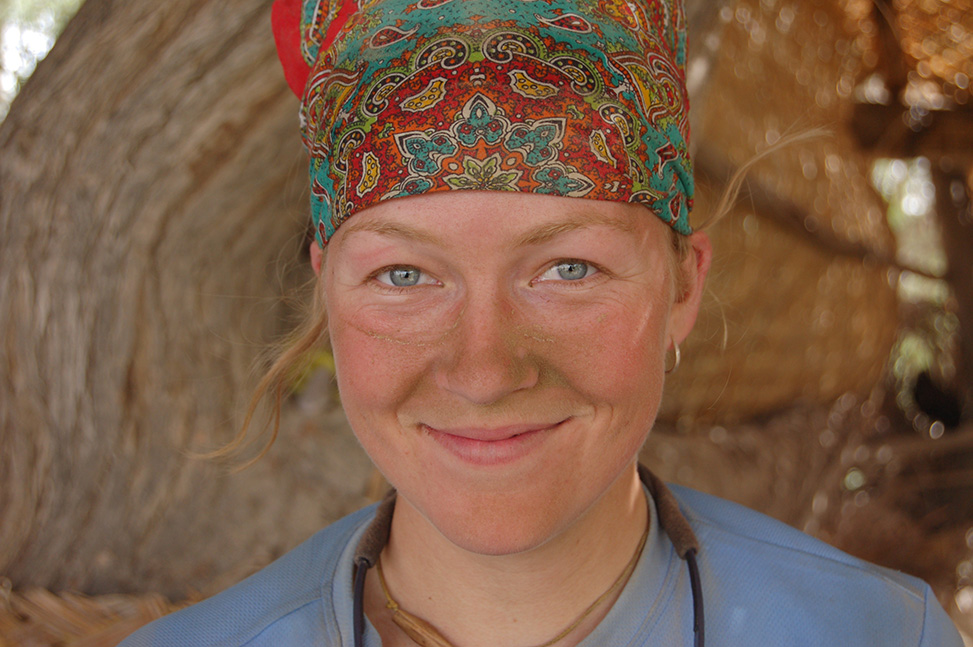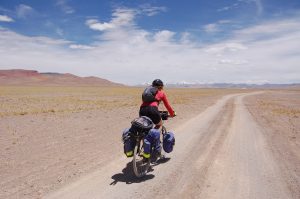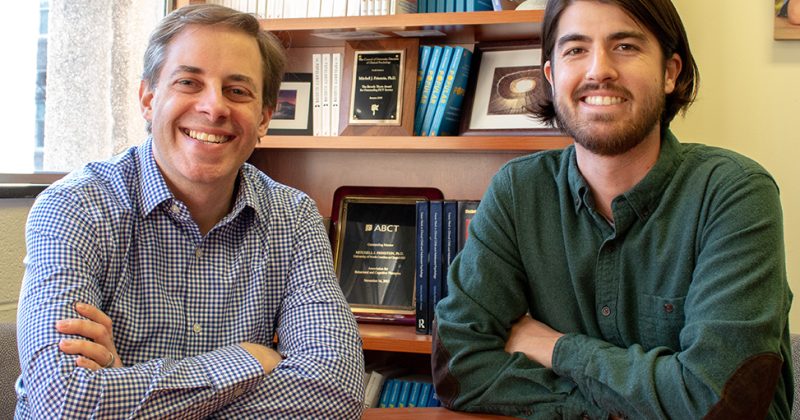
The real value of exploration “lies in how it expands our consciousness, our sense of connection with each other and the universe of which we’re a part,” says Kate Harris, who explored the Silk Road by bicycle. (photo by Mel Yule)
On a bicycle journey across the “world’s oldest superhighway,” writer-wanderer Kate Harris sought out ancient routes and a world not yet paved over.

Kate Harris ’05 once longed to visit Mars, but in recent years she has come to realize that Earth is a pretty marvelous place. For one, there’s the breathtaking view of the Juneau Icefield from the window of her off-the-grid log cabin in Atlin, British Columbia. It served as the perfect inspiration to document her epic journey of 10 months, 10 countries and 10,000 kilometers (over 6,000 miles) by bicycle with her best friend Mel Yule across the Silk Road, a network of ancient trade routes connecting Europe and Asia.
The result is her insightful 2018 travelogue, Lands of Lost Borders: A Journey on the Silk Road, which has garnered praise and prizes in her native Canada and the United States.
Her appetite for exploration began early, with a childhood fascination with Marco Polo. Thanks to the Morehead-Cain Scholarship and various fellowships, Carolina became a “launch pad” that fueled her wanderlust. She explored and conducted research in places far and wide — Alaska, Antarctica, Borneo, Mongolia and the Mars Desert Research Station in Utah. She majored in biology and minored in geology, won a Rhodes Scholarship to study the history of science at Oxford University and continued to set her sights on the “red planet.”
In 2006, she and Mel took a four-month journey by bike across a portion of the Silk Road, sneaking through a military checkpoint, making their way to the Tibetan Plateau, the highest region on Earth.
Some day they vowed to return, and in 2011 they did, this time for a nearly yearlong bike trek through some of the most remote places on Earth, through tiny villages and across vast mountain ranges, from Turkey to Tajikistan to Tibet and beyond. Harris had become disillusioned with Polo’s true motives for exploring the Silk Road — fame and fortune — and vowed to experience it anew. The journey was both disheartening and uplifting. One of the surprises along the way was the connections she made not only with the land but its people.
“I set off in search of wildness, but what made the trip so wonderful was people — complete strangers who had no obligation to treat us like lost family,” Harris said.
In the book, she writes that “travel is perhaps one part geography, nine parts imagination.” She began to realize that Earth could be just as fulfilling as Mars.
“My impression of the world from books and atlases was that so much had already been explored and paved over, but coming into contact with the actual world changed me,” she said. “There is so much wonder out there.” Wonder in places like a highway lit with stars in Uzbekistan (captured in a photo for the book cover) or the Juneau Icefield, a place she first discovered as a young Carolina undergraduate researcher and vowed someday to live near its borders.
With oodles of instant noodles and flat tires behind her, next up for Harris is to earn her pilot’s license. “Flight lets you see the world in its totality from above, where you get a sense of its scale and grandeur,” she said.
Harris urges Carolina students to go beyond the confines of Chapel Hill, to add “explorer” to their undergraduate resumes. In retrospect, she said she was so single-mindedly focused on academic success that she almost didn’t take a semester off to do research in Antarctica.
“The fact of it is I wouldn’t be who I am if I hadn’t taken what looked like detours at the time, but were in fact part of the destination.
“Expose yourself to the unfamiliar as much as possible. You might fall in love with something you’ve never encountered before.”
Read an “online extra” Q&A with Harris.
Learn about another student’s Juneau Icefield research expedition.
By Kim Weaver Spurr ’88
Published in the Spring 2019 issue | Tar Heels Up Close
Read More

From math to mental health
Graduate student Matthew Clayton (right) and his adviser, Mitch Prinstein,…



